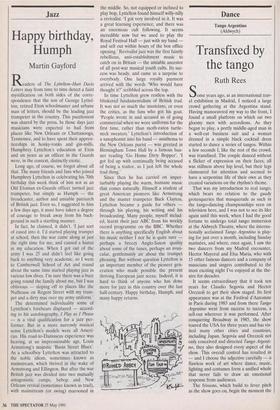Jazz
Happy birthday, Humph
Martin Gayford
Readers of The Lyttelton-Hart Davis Letters may from time to time detect a faint mystification on both sides of the corre- spondence that the son of George Lyttel- ton, retired Eton schoolmaster and urbane man of letters, should be the leading jazz trumpeter in the country. This puzzlement was shared by the press. In those days jazz musicians were expected to hail from places like New Orleans or Chattanooga, Tennessee, and to have spent their appren- ticeships in honky-tonks and gin-mills. Humphrey Lyttelton's education at Eton and six years as an officer in the Guards were, in the context, distinctly exotic.
Long ago, of course, we forgot about all that. The many friends and fans who joined Humphrey Lyttelton in celebrating his 70th birthday this week think of him not as an Old Etonian ex-Guards officer turned jazz trumpeter, but simply as Humph — the broadcaster, author and amiable patriarch of British jazz. Even so, I suggested to him a few days ago, it must have taken a degree of courage to break away from his back- ground in such a startling manner.
In fact, he claimed, it didn't. 'I just sort of eased into it. I'd started playing trumpet at school, then the war came along at just the right time for me, and caused a hiatus in my education. When I got out of the army I was 25 and didn't feel like going back to anything very academic, so I went to Camberwell School of Art and round about the same time started playing jazz in various low dives. I'm sure there was a buzz going round the family about me, but I was oblivious — sloping off to places like the Nuthouse on Regent Street with my trum- pet and a dirty mac over my army uniform.'
The determined individuality some of Lyttelton's forebears displayed — accord- ing to his autobiography, I Play as I Please — is a vital qualification for a jazz per- former. But in a more narrowly musical sense Lyttelton's models were all Ameri- can. His road-to-Damascus experience was hearing, at an impressionable age, Louis Armstrong's majestic 'Basin Street Blues'. As a schoolboy Lyttelton was attracted to the noble idiom, sometimes known as mainstream, which thrived in the wake of Armstrong and Ellington. But after the war British jazz was divided into two mutually antagonistic camps, bebop and New Orleans revival (sometimes known as trad), with mainstream (or swing) marooned in
the middle. So, not equipped or inclined to play bop, Lyttelton found himself willy-nilly a revivalist. 'I got very involved in it. It was a great learning experience, and there was an enormous cult following. It seems incredible now but we used to play the Royal Festival Hall — just with my band and sell out within hours of the box office opening.' Revivalist jazz was the first faintly rebellious, anti-establishment music to catch on in Britain — the amiable ancestor of all post-war musical youth cults. Its suc- cess was heady, and came as a surprise to everybody. One large royalty payment arrived with the words 'Who would have thought it?' scribbled across the top.
In time Lyttelton grew restless with the blinkered fundamentalism of British trad. It was not so much the musicians, or even the critics, as the fans who got his goat. `People wrote in and accused us of going commercial when we wore uniforms for the first time, rather than moth-eaten turtle- neck sweaters.' Lyttelton's introduction of a saxophonist into his band — anathema to the New Orleans purist — was greeted in Birmingham Town Hall by a famous ban- ner reading 'Go Home Dirty Bopper'. 'I got fed up with continually being accused of being a traitor, so I just left the whole trad thing.'
Since then he has carried on imper- turbably playing the warm, humane music that comes naturally. Himself a student of great American pioneers like Armstrong and the master trumpeter Buck Clayton, Lyttelton became a guide for others through his playing, his writing and his broadcasting. Many people, myself includ- ed, learnt their jazz ABC from his weekly record programme on the BBC. Whether there is anything specifically English about his music neither I nor he is quite sure perhaps a breezy Anglo-Saxon quality about some of the tunes, perhaps an avun- cular, gentlemanly air about the trumpet phrasing. But without question Lyttelton is an important member of the pioneer gen- eration who made possible the present thriving European jazz scene. Indeed, it is hard to think of anyone who has done more for jazz in this country over the last half-century. Happy birthday, Humph, and many happy returns.


















































 Previous page
Previous page